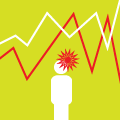What do you do when a bear (market) is charging at you?
Stress is sometimes a good thing. It motivates us to work hard for that vacation in the Virgin Islands and lets us know that walking around at night in a high-crime area is a no-no. But it can also affect the way we make financial decisions, and not always for the better. In one study, acute external stress made investors extra-risky where losses were concerned (i.e. people were much more likely to take a 20% chance of losing $3.00 than an 80% chance of losing $0.75). The opposite is true for gains (i.e. people were much more likely to choose a 60% chance of winning $1.00 than a 40% chance of $1.50). This phenomenon is known as the reflection effect, and it is intensified under stress.
Stress impairs our executive functioning – it makes it harder for us to evaluate stimuli. When this happens, we often rely on established biases, like the reflection effect, for decision-making. This is perfectly normal and adaptive, as seen in the scenario of a person standing in front of an approaching bear. If a bear is sprinting towards us at full speed, we don’t have time to think about all the possible ways we could get away (across the river, up a tree, through the field). It makes a lot more sense for us to just think “RUN!” and take off in some direction, even if it would be objectively better to take one path over another. (Actually, depending on the bear, it may be safest to climb a tree or curl up in a ball.) Similarly, an investor under stress might take riskier bets that can result in large losses or park all savings in CDs for woefully meager returns. Whatever the tendency, stress will propel us more strongly in that direction and thwart our intentions for diversified investments.
Reference: Porcelli and Delgado, 2009, in Psychological Science Vol 20, No. 3.
Joe Grammer works in a suicide prevention research lab at the National Naval Medical Base. At Community Ladders, he writes about psychology and how it relates to finance and consumer choices.

Comments are closed.